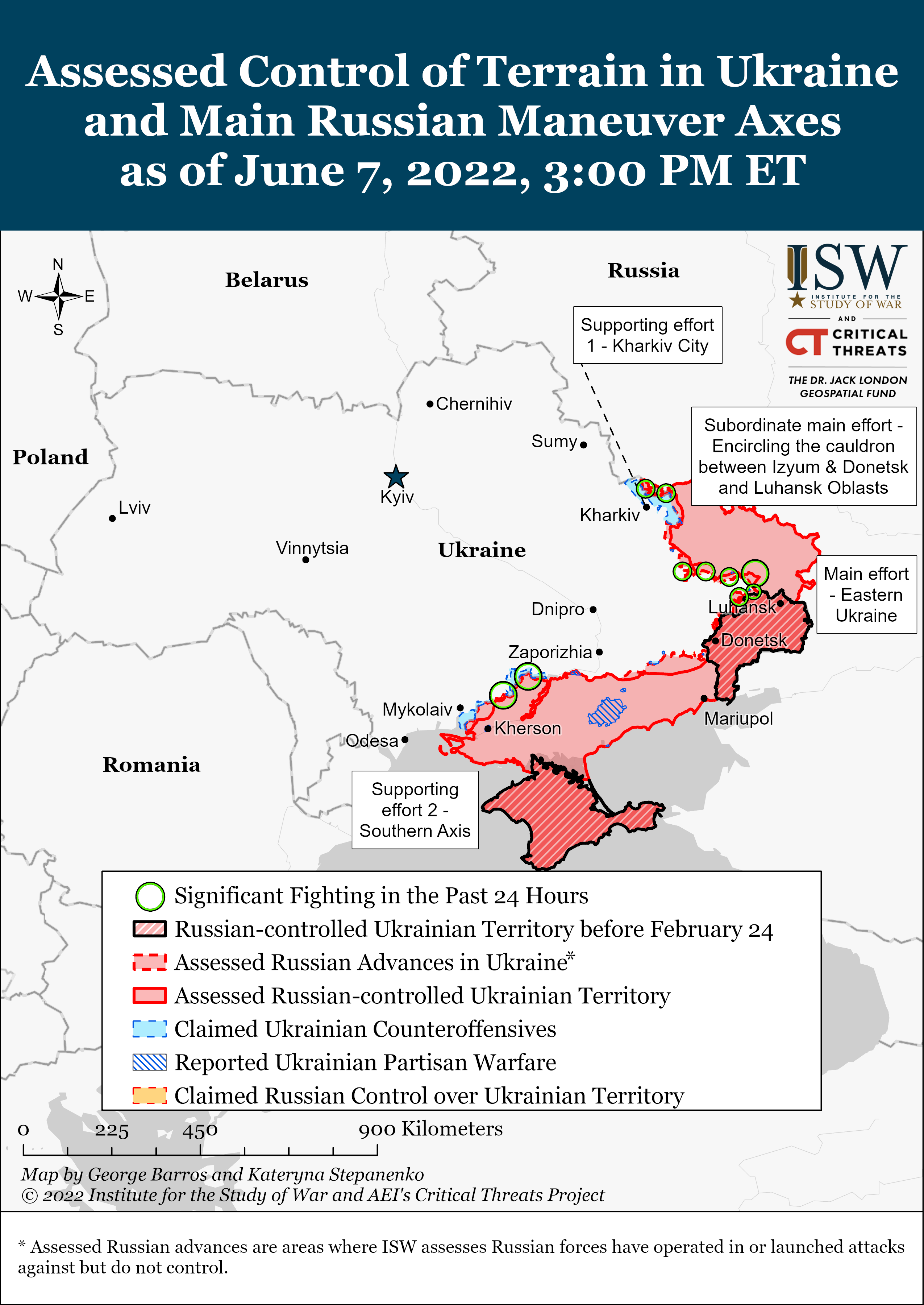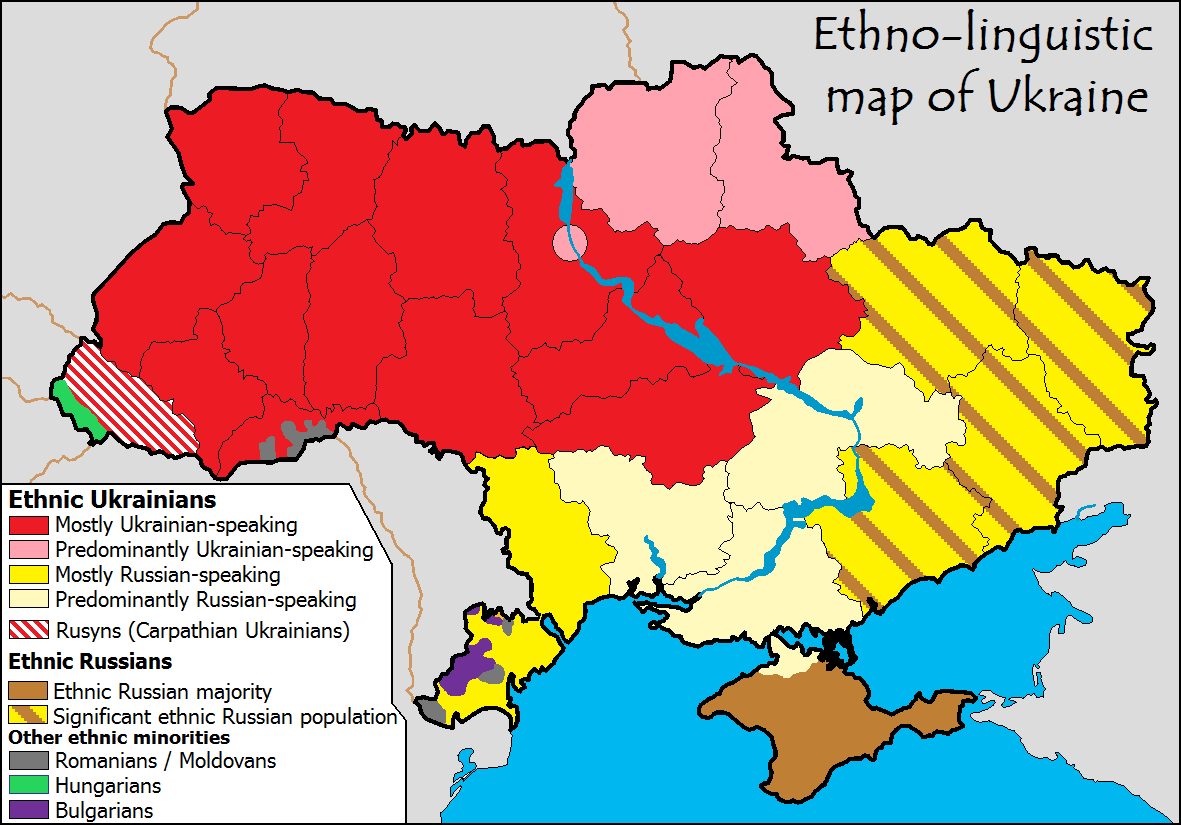ISW Upgrades. These are deliberately posted without comment in order for members to reach their own conclusions.
Russian Offensive Campaign Assessment, June 7
Russian Offensive Campaign Assessment, June 7 | Institute for the Study of War (understandingwar.org)
June 7, 6:45 pm ET
Main Points.

Click here to see ISW's interactive map of the Russian invasion of Ukraine. This map is updated daily alongside the static maps present in this report.
Russian forces continued offensive operations in several locations in eastern Ukraine but did not secure any confirmed gains in ground assaults on June 7. Russian forces have likely captured most of Severodonetsk, but ISW cannot confirm the exact control of terrain within the city.[1] Russian forces additionally redeployed troops east of Bakhmut to renew offensives to secure access to highways northeast of Bakhmut and threaten Ukrainian lines of communication.[2] Russian troops north of Slovyansk will likely seek to advance toward Slovyansk and Kramatorsk from positions north of the city.[3] Russian forces on the Southern Axis are reportedly redeploying away from Zaporizhia Oblast toward Kherson Oblast, likely in order to support Russian defensive positions that have been threatened by Ukrainian counterattacks along the Mykolaiv-Kherson Oblast border south of Davydiv Brid.[4]
Members of the Russian military community are accusing Ukrainian forces of escalating artillery attacks on Russian rear areas in a likely attempt to dissuade further Western support to the Ukrainian military. Former FSB agent Igor Girkin (also known as Strelkov) accused Ukrainian troops of perpetrating “terrorist attacks” against residential areas of Donetsk City, Horlivka, and Makiivka. [5] A Russian source additionally accused Ukrainian forces of firing on Shyroka Balka, Kherson Oblast. [6] Ukrainian social media users denied the claims and stated that they are likely false-flag attempts to spoil Western opinion of the Ukrainian military and halt military aid to the Ukrainian Armed Forces. [7]
The Kremlin’s efforts to censor information about deceased military personnel and ongoing forced mobilization within the DNR and LNR are reportedly exacerbating domestic tensions and opposition to the war in Russia. The Ukrainian Military Intelligence Directorate (GUR) reported that the Kremlin assigned lawyers and psychologists to convince families of personnel of the sunken cruiser Moskva to refrain from disclosing any information regarding the deaths of their relatives in an effort to crush rising social tensions in Russia. [8] The GUR stated that the Kremlin is threatening to nullify financial compensation to the families of Moskva crew members if they publicly discuss the sinking of the cruiser, resulting in some relatives refusing to meet with Black Sesa Fleet commanders in Sevastopol in protest. Ukrainian media sources separately reported that the Donetsk People’s Republic (DNR) altered mobilization protocols and is now promising compensation for wounded and deceased personnel due to DNR servicemen rioting at the frontlines. [9]
Domestic Russian complaints about the maltreatment and lack of preparation among Russian combat forces are likely prompting the Kremlin to take rhetorical steps to curb discontent. Russian Defense Minister Sergey Shoigu stated that new conscripts during the summer training period will be trained with specific attention to lessons learned so far in Ukraine during a meeting with the National Defense Management Center (NDCC) (the supreme command center of the Russian Armed Forces and Defense Ministry) on June 7. Shoigu added that summer conscripts will learn battlefield first aid, likely responding to criticisms by members of the Russian military community of poor tactics and lack of first aid acumen among Russian soldiers. [10] However, the Russian military is unlikely to properly train and equip Russian conscripts rushed to the front as replacements and likely primarily seeks to mollify public discontent. Former DNR Security Minister and milblogger Alexander Khodakovsky claimed that he asked the DNR military command to move exhausted and demoralized proxy conscripts to auxiliary tasks away from the line of contact but to no avail. [11]
Full article at link above. There is no pdf download today.
Russian Offensive Campaign Assessment, June 7
Russian Offensive Campaign Assessment, June 7 | Institute for the Study of War (understandingwar.org)
June 7, 6:45 pm ET
Main Points.
- Russian forces have likely established control over the majority of the residential sector of Severodonetsk and conducted assaults against Ukrainian positions in the industrial zone in the past 24 hours. The operational environment within the city remains fluid.
- Russian forces continued efforts to advance on Slovyansk southeast from the Izyum area and west from Lyman, attempting to break through Ukrainian defenses that have halted most direct frontal assaults from Izyum.
- Russian forces are likely attempting to reinforce their operations in the Severodonetsk-Lysychansk area from both the Toshkivka-Ustynivka area in the south and Kupyansk from the northwest.
- Russian forces began withdrawing troops from positions in Zaporizhia Oblast, likely either to rotate damaged units into rear areas or to reinforce Russian defenses in northwestern Kherson Oblast, though ISW cannot currently confirm the destination of these forces.
- Russian forces failed to regain advanced positions on the western (now Ukrainian-occupied) bank of the Ihulets River on June 7.
- Russian Defense Minister Sergei Shoigu announced that Russian forces restored transit connections between newly occupied cities and Crimea.
- Russian occupation authorities continue to face challenges suppressing Ukrainian resistance and finding partisan supporters despite increasingly draconian occupation measures and attempts to bribe Ukrainian civilians.

Click here to see ISW's interactive map of the Russian invasion of Ukraine. This map is updated daily alongside the static maps present in this report.
Russian forces continued offensive operations in several locations in eastern Ukraine but did not secure any confirmed gains in ground assaults on June 7. Russian forces have likely captured most of Severodonetsk, but ISW cannot confirm the exact control of terrain within the city.[1] Russian forces additionally redeployed troops east of Bakhmut to renew offensives to secure access to highways northeast of Bakhmut and threaten Ukrainian lines of communication.[2] Russian troops north of Slovyansk will likely seek to advance toward Slovyansk and Kramatorsk from positions north of the city.[3] Russian forces on the Southern Axis are reportedly redeploying away from Zaporizhia Oblast toward Kherson Oblast, likely in order to support Russian defensive positions that have been threatened by Ukrainian counterattacks along the Mykolaiv-Kherson Oblast border south of Davydiv Brid.[4]
Members of the Russian military community are accusing Ukrainian forces of escalating artillery attacks on Russian rear areas in a likely attempt to dissuade further Western support to the Ukrainian military. Former FSB agent Igor Girkin (also known as Strelkov) accused Ukrainian troops of perpetrating “terrorist attacks” against residential areas of Donetsk City, Horlivka, and Makiivka. [5] A Russian source additionally accused Ukrainian forces of firing on Shyroka Balka, Kherson Oblast. [6] Ukrainian social media users denied the claims and stated that they are likely false-flag attempts to spoil Western opinion of the Ukrainian military and halt military aid to the Ukrainian Armed Forces. [7]
The Kremlin’s efforts to censor information about deceased military personnel and ongoing forced mobilization within the DNR and LNR are reportedly exacerbating domestic tensions and opposition to the war in Russia. The Ukrainian Military Intelligence Directorate (GUR) reported that the Kremlin assigned lawyers and psychologists to convince families of personnel of the sunken cruiser Moskva to refrain from disclosing any information regarding the deaths of their relatives in an effort to crush rising social tensions in Russia. [8] The GUR stated that the Kremlin is threatening to nullify financial compensation to the families of Moskva crew members if they publicly discuss the sinking of the cruiser, resulting in some relatives refusing to meet with Black Sesa Fleet commanders in Sevastopol in protest. Ukrainian media sources separately reported that the Donetsk People’s Republic (DNR) altered mobilization protocols and is now promising compensation for wounded and deceased personnel due to DNR servicemen rioting at the frontlines. [9]
Domestic Russian complaints about the maltreatment and lack of preparation among Russian combat forces are likely prompting the Kremlin to take rhetorical steps to curb discontent. Russian Defense Minister Sergey Shoigu stated that new conscripts during the summer training period will be trained with specific attention to lessons learned so far in Ukraine during a meeting with the National Defense Management Center (NDCC) (the supreme command center of the Russian Armed Forces and Defense Ministry) on June 7. Shoigu added that summer conscripts will learn battlefield first aid, likely responding to criticisms by members of the Russian military community of poor tactics and lack of first aid acumen among Russian soldiers. [10] However, the Russian military is unlikely to properly train and equip Russian conscripts rushed to the front as replacements and likely primarily seeks to mollify public discontent. Former DNR Security Minister and milblogger Alexander Khodakovsky claimed that he asked the DNR military command to move exhausted and demoralized proxy conscripts to auxiliary tasks away from the line of contact but to no avail. [11]
Full article at link above. There is no pdf download today.


























